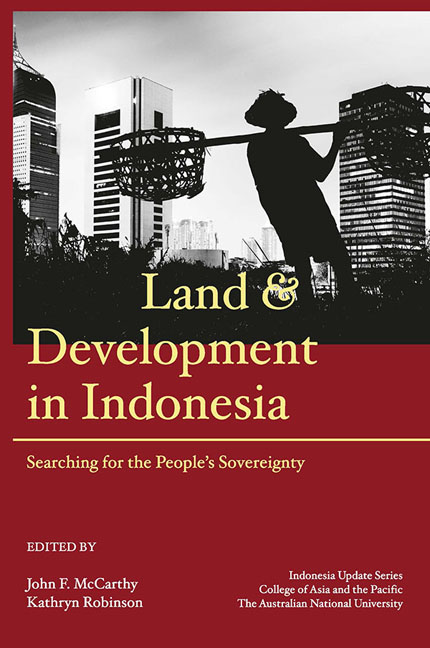Book contents
- Frontmatter
- Contents
- Tables
- Figures
- Contributors
- Acknowledgements
- Glossary
- Map
- 1 Land, economic development, social justice and environmental management in Indonesia: the search for the people's sovereignty
- PART 1 LAND USE AND LAND LAW: THE BIG PICTURE
- PART 2 ENVIRONMENTAL AND CUSTOMARY FRAMING OF LAND TENURE
- PART 3 URBAN AND INFRASTRUCTURE DEVELOPMENT
- PART 4 AGRICULTURE, LAND TENURE AND LIVELIHOODS
- 10 After 200 years, why is Indonesia's cadastral system still incomplete?
- 11 Agrarian transformations and land reform in Indonesia
- 12 Land tenure and agrarian structure in regions of small-scale food production
- PART 5 LARGE-SCALE LAND ACQUISITIONS AND SMALLHOLDER DEVELOPMENT
- Index
- Miscellaneous Endmatter
10 - After 200 years, why is Indonesia's cadastral system still incomplete?
from PART 4 - AGRICULTURE, LAND TENURE AND LIVELIHOODS
Published online by Cambridge University Press: 29 July 2017
- Frontmatter
- Contents
- Tables
- Figures
- Contributors
- Acknowledgements
- Glossary
- Map
- 1 Land, economic development, social justice and environmental management in Indonesia: the search for the people's sovereignty
- PART 1 LAND USE AND LAND LAW: THE BIG PICTURE
- PART 2 ENVIRONMENTAL AND CUSTOMARY FRAMING OF LAND TENURE
- PART 3 URBAN AND INFRASTRUCTURE DEVELOPMENT
- PART 4 AGRICULTURE, LAND TENURE AND LIVELIHOODS
- 10 After 200 years, why is Indonesia's cadastral system still incomplete?
- 11 Agrarian transformations and land reform in Indonesia
- 12 Land tenure and agrarian structure in regions of small-scale food production
- PART 5 LARGE-SCALE LAND ACQUISITIONS AND SMALLHOLDER DEVELOPMENT
- Index
- Miscellaneous Endmatter
Summary
In October 2014, President Joko Widodo appointed Ferry Mursyidan Baldan as Indonesia's minister of agrarian affairs and spatial planning. Supported by a new ministry, he assumed responsibility for agrarian affairs, including the vexed issue of rural land registration. The creation of a new ministry is indicative of the urgency to sort out the complications of Indonesia's agrarian affairs. But urgency to resolve agrarian issues is nothing new. In response to public discussions, official investigations have looked into issues of land registration and governments have vouched to resolve them on many occasions during the past 200 years. What were the shortcomings of the administrative processes and structures that were put in place in the past to resolve agrarian issues, and why is the coverage of Indonesia's cadastral system still not comprehensive?
This chapter offers a historical overview of attempts to introduce a cadastral system of measurement, registration and certification of land titles in rural Indonesia since 1813. Its purpose is to help explain the cir-cumstances that led to the current situation of sustained uncertainty of land titles in Indonesia, particularly in rural areas. What was done to safeguard rights to farmland in rural areas of Indonesia and to assess the success or failure of such efforts? To answer those questions, this chapter will discuss in a broadly chronological fashion how the measurement, registration and certification of farmland developed in response to land taxation and agrarian legislation.
LAND TAX AND LAND REGISTRATION IN THE NINETEENTH CENTURY
Indonesia has long been a legal patchwork, reflected in the ways in which rights to land were defined and upheld. For a long time, the laws and regulations of the Dutch colonial state applied only to areas under direct colonial rule, and Indonesia's self-governing principalities retained much of their legal systems. Legislation of the colonial state affecting rights to land gradually spread across the country as part of the extension of colonial rule across Indonesia during the late nineteenth century (Lindblad 1989). After Indonesia's federal structure was abolished in 1951 (after independence was achieved in 1949), the legal system remained a combination of colonial laws and regulations, new legislation and regulations, and the vestiges of regionally very different customary (adat) regulations.
The unification of agrarian legislation started with the extension in 1813 of a real estate tax (verponding) in the city of Batavia to the surrounding areas, and later to other urban areas.
- Type
- Chapter
- Information
- Land and Development in IndonesiaSearching for the People's Sovereignty, pp. 227 - 244Publisher: ISEAS–Yusof Ishak InstitutePrint publication year: 2016



